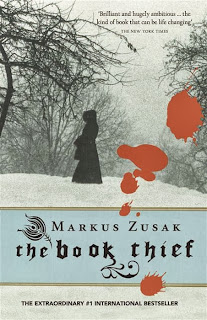They are the ones that challenge your perceptions and ideologies and change the way you carry your own opinions.
Written by Australian author, Markus Zusak, The Book Thief is one of the most incredible novels I have ever read.
A colleague of mine recommended it to me as a fantastic read and said that I would be captured from the very first sentence; that the narrative was intriguing and seductive in the most unpredictable way.
As a self-confessed bookworm and literary lover, I am not easily enthralled or captivated by novels from the get go. They have to win me over with their creativity and descriptive prowess.
However, The Book Thief gripped me like no book ever had. Literally, from the very first sentence. And after that I was hooked until the very last word (which was read through eyes that had fallen victim to tear duct overdrive).
I have always been a sucker for historical fiction because it still demands imagination in its creation but it is simultaneously so well researched and informative- you learn something while being entertained.
And most intriguing to me are said novels set during the second World War.
Never has there be a time when heinous and humane actions were so intrinsically linked - the unspeakable, unforgivable horrors inflicted on people by the propaganda-forced hands of another were balanced by such incredible stories of bravery, sacrifice and ultimate morality.
Nazi Germany showed both the ugliest and most beautiful capacities of the human spirit.
Set in the above, The Book Thief is narrated through the all-seeing eyes of Death, because during those years he was everywhere; gently ushering souls across the divide between earth and Heaven.
Death first crosses paths with Liesel Meminger as she is standing beside the graveside of her younger brother, who He had just taken to the other side.
He watches her find a small book partially buried in the snowdrifts, The Gravedigger's Handbook, and slip it into her coat.
This is the first act of book thievery by Liesel and the beginning of an undeniable love affair with books and words.
Liesel is taken in by a foster family after her mother is unable to care for her any longer and her adoptive Papa teaches her how to read.
Once finished with The Gravedigger's Handbook, Liesel begins stealing books from Nazi book burnings, the library of the mayor's wife and from anywhere else where they can be snatched without detection.
However, when Liesel's family takes in a Jewish fist-fighter and hides him in their basement, any remaining shred of Liesel's innocence is lost as she begins to comprehend what is truly happening in a world she thought she understood.
I am very conscious of giving away too much in this "review" so I have only divulged with you a brief synopsis that contains very few pertinent details.
In the rawest sense, The Book Thief is a story about the intense power that can burn in words and how they can change lives; they can create and destroy, they can redeem and condemn.
If you have a tendency to get emotionally invested in books, I strongly suggest you have a box of tissues within arms reach, otherwise the text will be hard to make out on the pages by the end.
To put it in perspective, I continued to cry for about half an hour after I finished reading it.
On 8 November, the film adaptation of The Book Thief will hit cinemas worldwide, with the absurdly amazing Geoffrey Rush playing Papa.
If you have any time over the next few weeks to get stuck into this book, I highly recommend doing so before you see the movie.
I promise that you will be blown away by Zusak's unparalleled ability to tell an unforgettable story as well as the incredible way he has constructed the narrative to do so.
In summary, The Book Thief is poignant, beautiful, mesmorising, brutal and hearbreaking; effortlessly encapsulating the collision of good and evil during one of the most infamous times in our history.





No comments:
Post a Comment